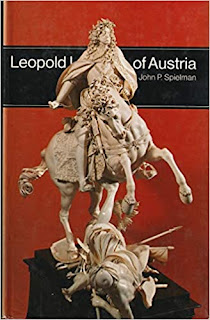This biography of Emperor Leopold I (1640-1705) by John Spielman is not a new book but one I picked up during one of my recent second-hand bookshop rummages. When you think about Austria in this period, you tend to gravitate towards someone like Prince Eugene. The subject of a recent biography by James Faulkner. Despite being the Holy Roman Emperor, he has been somewhat eclipsed by the great generals of the period and his longstanding opponent Louis XIV of France.
Leopold was not noted for being decisive. A profoundly religious man ruling over a Catholic state but with significant protestant enclaves and fiercely protestant states with the Empire. His response to a crisis was often prayer, and he even strongly believed in miracles. He often needed one!
The Spanish succession was a constant theme as they were a family interest. Charles of Spain lasted longer than many expected, but without a direct heir. This eventually led to war with France, and he lived long enough to see the great victory at Blenheim. His succession looked at risk in the early years, and he lost two wives. However, he eventually managed nine children.
In the east, the focus was on recovering Hungary and dealing with frequent revolts and civil wars in that troubled country. The high point was the defeat of the Ottomans at the gates of Vienna in 1683, although Leopold left the city before the Ottomans arrived. The Austrians and their allies pushed the borders back to the Danube in the following years, including Prince Eugene's decisive victory at Zenta.
While Leopold was no strategist and did little personally, Spielman argues that Leopold helped to build the alliances that provided the troops and cash necessary to achieve victory. Securing these new territories was a challenge passed on to his descendants.
You can pick up a copy of this book at a reasonable price, and I suspect libraries stock it. It is worth a read for a different perspective on the period, and Spielman tells the story well.
 |
| Austrian infantry slugs it out with the janissaries. 28mm figures from my collection. |

Thanks for the review, but I suspect I’d rather go with something on Prince Eugene (which you’ve already reviewed). 😉
ReplyDeleteCheers,
Geoff